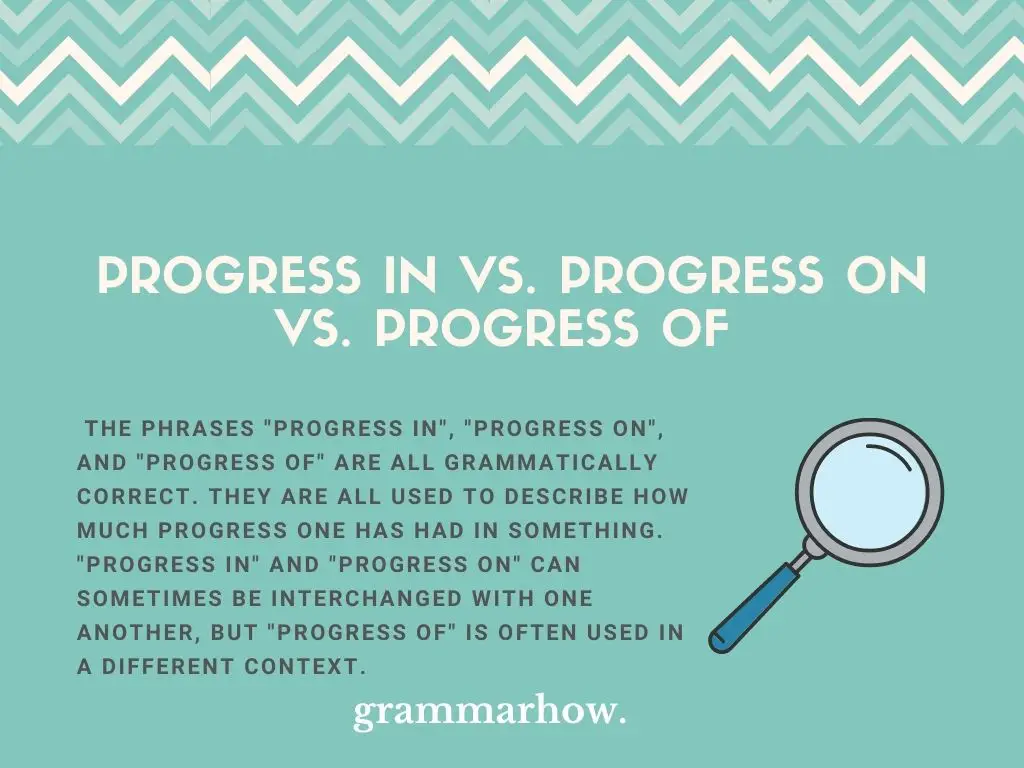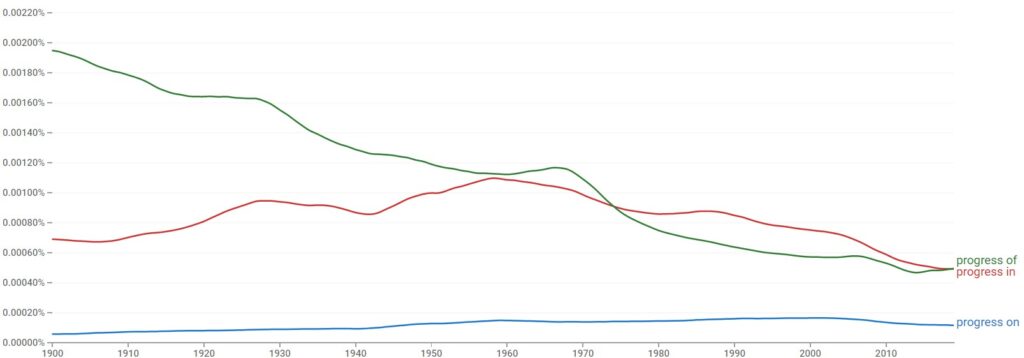There are many prepositions in the English language. You must be careful when using any of these, even with the same word, because each preposition can subtly change the meaning of a phrase. In this article, we’ll be discussing some prepositions that go with the word “progress”.
Progress In vs. Progress On vs. Progress Of
The phrases “progress in”, “progress on”, and “progress of” are all grammatically correct. They are all used to describe how much progress one has had in something. “Progress in” and “progress on” can sometimes be interchanged with one another, but “progress of” is often used in a different context.

The word “progress” can be followed by the prepositions: “in”, “on”, and “of”. All three phrases, “progress in”, “progress on”, and “progress of”, are used to describe how much progress one has had in an endeavor.
The phrases “progress in” and “progress on” are often interchangeable. However, “progress of” cannot be used in certain situations. For example:
- Has there been any progress in your project?
- Has there been any progress on your project?
- Incorrect: Has there been any progress of your project?
The phrase “progress of” does not work in the above sentence, while “progress in” and “progress on” both do.
There are, however, some situations in which all three can be used interchangeably in a sentence, as seen in the sentences below:
- The progress of your project has been astounding.
- The progress in your project has been astounding.
- The progress on your project has been astounding.
All three of the above sentences are grammatically correct and share the same meaning: that the rate of progress has been astounding.
Progress In
The phrase “progress in” can be used to describe how much progress one has had in a certain endeavor.
The preposition “in” means “inside or within” something. When used in the context of the phrase “progress in”, the “inside or within” being described is theoretical rather than literal. It is just a way of referring to something.
“Progress in” is used to describe how much progress one has had in a certain endeavor.
Below are examples of how to use “progress in” in a sentence:
- I can’t believe Keisha has had that much progress in her thesis.
- The fact that we didn’t argue today speaks to the progress in our relationship.
- Has there been any progress in Thomas’ experiment?
- Sometimes it feels like there hasn’t been any progress in my life since he left me.
- I’m so proud of the progress in my daughter’s writing!
- I really admire the progress in your communication skills.
- Ken is extremely nervous about tomorrow’s progress report because he hasn’t made much progress in his project.
Progress On
“Progress on” is a phrase used to describe how much progress one has had in a specific undertaking.
The preposition “on” has several meanings, one of which is “relating to something”. When used with the word “progress”, this is the definition that is used.
When you need to describe how much progress one has had in a specific undertaking, you can use the phrase “progress on”.
Below are examples of how to use “progress on” in a sentence:
- How much progress on your paper are you planning on making today?
- I can’t say I’m surprised at all the progress on your project, you’ve been working all week!
- Laura has made quite a bit of progress on her presentation skills.
- Kevin’s progress on his art project is significant, considering what it looked like two hours ago.
- Don’t ask me if I’ve made any progress on my paper sculpture.
- My friends have all made progress on their dissertations, while I spent my weekend vacationing at the beach.
- My brain isn’t working today, I can’t make any more progress on my research paper.
Progress Of
The phrase “progress of” is used to refer to the specific undertaking one has made progress on, usually to describe how much progress has been made.
The preposition “of” is used to describe possession or belonging. In the context of the phrase “progress of”, what is being described is the specific undertaking in which one has or has not made progress.
Below are examples of how to use “progress of” in a sentence:
- The progress of Malik’s paper seems more rapid than yours.
- The slow and steady progress of the building of the ship took years to finish.
- Professor Karim Potter seems pleased at the rate of progress of Cathy’s thesis.
- The progress of your relationship with Abdul has been so fast, that it’s practically giving me whiplash!
- The progress of Kyle’s growth as a person has been beautiful to witness firsthand.
- Kyra seems surprised at the rapid progress of Lori’s academic career.
- Sometimes progress is unnoticeable, but the progress of your communication and leadership skills over the years has been remarkable.
Which Is Used The Most?
The phrases “progress of” and “progress in” are used as much as each other, according to data from Google Ngram Viewer. Meanwhile, the phrase “progress on” is the least used of the three.
Google Ngram Viewer allows us to compare how frequently each of the three phrases is used in a wide range of books. Using data from English books published between the years 1900-2019, we can see that both “progress of” and “progress in” are equally as popular as each other.

The phrase “progress on”, on the other hand, is currently the least popular of the three. It has also been the least popular of the three since the year 1900.
Interestingly, the phrase “progress of” was more popular than “progress in” from the years 1900 to about 1973. From 1974 to approximately 2017, the phrase “progress in” was more popular than “progress of”.
Since about 2017, both “progress of” and “progress in” have been used as frequently as the other.
Final Thoughts
The phrases “progress in”, “progress on”, and “progress of” are all used to describe how much progress one has had in a particular undertaking or endeavor. “Progress in” and “progress on” are usually interchangeable with one another, while “progress of” is often used in a different context.
You may also like: In Process vs. In Progress: Difference Explained (14 Examples)
